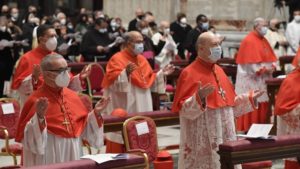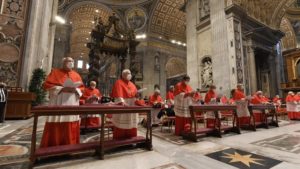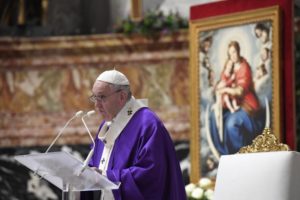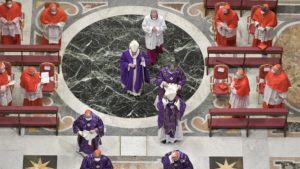Advent is a continuous call to hope: it reminds us that God is present in history to lead humanity to its ultimate goal and fullness, which is the Lord Jesus Christ. God is with us, present throughout history, beside us and supporting us. He never abandons us and, amid life’s storms, extend His hand and free us.
Pope Francis offered this comfort today, Nov. 29, 2020, the first day of Advent, one day after the Ordinary Public Consistory for the creation of 13 new cardinals in a socially distant St. Peter’s Basilica as the world grapples with the COVID19 resurgence worldwide. He did so between his homily and his subsequent Angelus address.
The new cardinals concelebrated the Mass with the Holy Father, except Cardinals Cornelius Sim, Apostolic Vicar of Brunei, and Jose F. Advincula, Archbishop of Capiz, Philippines, who were not be able to travel to Rome for the consistory due to the contingent health situation, but were still created cardinals yesterday. Following yesterday’s consistory, the Holy Father and new cardinals were received by Benedict XVI in his residence Mater Ecclesiae, in the Vatican Gardens.
With Pope Francis ushering in Advent today, today’s Mass and Angelus had special value, beyond concelebrating with the new cardinals.
Following the Angelus, the Holy Father gave three recommendations for faithful this Season:
1) Greater Sobriety
2) Attention to the needy
3) Simple moments of prayer in our families
Francis acknowledged he is «well aware» that life is made up of highs and lows, of lights and shadows. Each one of us experiences moments of disappointment, of failure and being lost. Moreover, the pandemic has generated worry, fear and discouragement in many people, and risks falling into pessimism, closure and apathy.
Asking how should we react in the face of all this, the Pope quoted the Psalmist: “Our soul waits for the Lord: he is our help and our shield. Our heart is glad in him, because we trust in his holy name” (Ps 33:20-21).
«Confidently waiting for the Lord,» Francis said, «allows us to find comfort and courage in the dark moments of our lives.»
«Advent is a continuous call to hope: it reminds us that God is present in history to lead it to its ultimate goal and to its fullness, which is the Lord Jesus Christ. God is present in the history of humanity, He is the “God-with-us”, He walks beside us to support us.
«The Lord,» he said, «never abandons us; He accompanies us through the events of our lives to help us discover the meaning of the journey the meaning of everyday life, to give us courage when we are under duress or when we suffer.
In Midst of Life’s Storms, God Extends His Hand & Frees Us
In the midst of life’s storms, God always extends His hand to us and frees us from threats. It is up to us to cling to Him so as not to sink into the abyss, and so as to be found – as Paul says – “sustained to the end, guiltless in the day of our Lord Jesus Christ” (1 Cor 1:8).
Pope Francis prayed that Mary, the woman of the expectation, «accompany our steps at the beginning of this new liturgical year, and help us to fulfil the task of Jesus’ disciples, indicated by the Apostle Peter: to render an account for the hope that is in us (see 1 Pet 3:15).»
The Mass celebrated with the new cardinals this morning, participating in the celebration were also the existing cardinals, 12 parish priests and rectors of the titular churches of Cardinals and about 100 faithful, accompanying the new Cardinals.
The Holy Father noted that today’s readings suggest two key words for the season of Advent, namely closeness and vigilance. While the Prophet Isaiah says that God is close to us, Francis adds that Jesus in the Gospel, exhorts us to be vigilant while waiting for Him.
«Advent,» he said, «is the time in which to remember the closeness of God, who has come down to us.»
The first step of faith is to tell the Lord that we need him, his closeness. It is also the first message of Advent and of the liturgical year, to recognize God who is close and to tell him: «Come closer!»
«He wants to come close to us, but he proposes himself, he does not impose himself; it is up to us not to tire of telling Him: «Come!». It is up to us, it is the Advent prayer: «Come!». Jesus – Advent reminds us – came among us and will come again at the end of time. But we ask ourselves, what are these comings for if it does not come into our life today?»
Hence, Pope Francis says: Let’s invite Him. «Let us make our own the typical invocation of Advent: ‘Come, Lord Jesus.'»
Training Our Vigilance
«We can say it at the beginning of each day and repeat it often, before meetings, study, work and decisions to be made, in the most important moments and in those of trial: Come, Lord Jesus. A little prayer, but it comes from the heart. Let’s say it in this time of Advent, let’s repeat it: «Come, Lord Jesus.'»
By invoking His closeness, we will train our vigilance.
«It is important,» Francis reminded, «to remain vigilant, because a mistake in life is getting lost in a thousand things and not noticing God. St. Augustine said: «Timeo Iesum transeuntem» (Sermones, 88,14,13), «I am afraid that Jesus will pass by and I will not let me notice.»
Pope Francis recognized how often, ever day, we are attracted by our interests, distracted by so many vanities, that we risk losing the essential, and reminded that the day will come when we are with the Lord.
«He will arrive,» the Jesuit Pope stressed, urging: «let’s not lose heart: the night will pass, the Lord will rise, He who died on the cross for us will judge us. To watch is to wait for this, it is not to be overwhelmed by discouragement, and this is called living in hope.»
«As before we were born, we were awaited by those who loved us, now we are awaited by Love himself.»

«And if we are expected in Heaven, why live on earthly claims? Why bother with some money, some fame, some success, all things that pass? Why waste time complaining about the night, while the light of day awaits us? Looking to [protectors] to get a promotion and move up, to promote our career?»
«Everything passes,» Francis noted. «Watch, says the Lord.»
Not Easy to Stay Awake
The Successor of Peter recognized that staying awake is not easy. Noting the disciples of Jesus did not succeed, Francis warned that the same torpor can descend on us too, warning of the dangerous sleep of «mediocrity.»
«It comes when we forget our first love and go on by inertia, paying attention only to the quiet life. But without outbursts of love for God, without waiting for his newness, one becomes mediocre, lukewarm, worldly. And this corrodes faith, because faith is the opposite of mediocrity: it is God’s ardent desire, it is continuous audacity to convert, it is courage to love, it is always moving forward.
«Faith,» he continued, «is not water that extinguishes, it is fire that burns; it is not a sedative for those who are stressed, it is a love story for those in love! For this reason Jesus hates lukewarmness more than anything (cf. Rev 3:16). We see God’s contempt for the lukewarm.»
Remedies for Awaking From our Slumber
«So how can we wake up from the sleep of mediocrity?» Pope Francis asks, responding: with the vigilance of prayer .
«To pray is to turn on a light in the night. Prayer awakens from the lukewarmness of a horizontal life, raises our gaze upwards, attunes us to the Lord. Prayer allows God to be close to us; therefore it frees from loneliness and gives hope. Prayer oxygenates life: just as one cannot live without breathing, so one cannot be a Christian without praying».
There is so much need for Christians to watch over those who sleep, for worshipers, for intercessors, who day and night bring the darkness of history before Jesus, light of the world. There is a need for worshipers. We have lost a little the sense of adoration, of being in silence before the Lord, adoring. This is mediocrity, lukewarmness.
He also warned against the second «inner sleep» the «sleep of indifference.»
To bring light to that sleep of mediocrity, of lukewarmness, Francis said, there is the vigilance of prayer, while adding that to awaken us from this sleep of indifference, there is the vigilance of charity. «Charity,» he exclaimed, «is the beating heart of the Christian: just as one cannot live without a heartbeat, so one cannot be a Christian without charity.»
«Praying and loving, here,» Pope Francis says, «is vigilance.»
«When the Church worships God and serves others,» he explained, «She does not live in the night. Even if she is tired and tried, she walks towards the Lord. Let’s invoke him: Come, Lord Jesus, we need you. Come close to us. You are the light: wake us from the sleep of mediocrity, awaken us from the darkness of indifference.»
The Holy Father concluded, praying: «Come, Lord Jesus, make our hearts alert, which are now distracted: make us feel the desire to pray and the need to love.»
The prelates created Cardinals are: Bishop Mario Grech, Secretary-General of the Synod of Bishops; Bishop Marcello Semeraro, Prefect of the Congregation for the Causes of Saints; Archbishop Antoine Kambanda of Kigali, Rwanda; Archbishop Wilton Gregory of Washington; Archbishop José Advincula of Capiz, Philippines; Archbishop Celestino Aós Braco of Santiago de Chile; Bishop Cornelius Sim, titular Bishop of Puzia di Numidia and Vicar Apostolic of Brunei, Kuala Lumpur; Archbishop Augusto Paolo Lojudice of Siena-Colle Val d’Elsa-Montalcino; Fra Mauro Gambetti, Conventual Franciscan, Custodian of the Sacred Convent of Assisi; Bishop Felipe Arizmendi Esquivel, Bishop emeritus of San Cristóbal de las Casas, Mexico; Archbishop Silvano M. Tomasi, titular Archbishop of Asolo, Apostolic Nuncio; Fra Raniero Cantalamessa, Capuchin, Preacher of the Papal Household; Msgr Enrico Feroci, parish priest of Holy Mary of the Divine Love in Castel di Leva.
In consideration of the health dispositions in force at present, given the COVID-19 pandemic, the usual courtesy visits did not take place. Normally faithful, including some from the new cardinals’ native countries, have the opportunity briefly greet the new Eminences between the Vatican’s Paul VI Hall and the Vatican’s Apostolic Palace for a two hour window.
Here is the Vatican’s full translation of the Holy Father’s homily:
***
Today’s readings propose two key words for the Advent season: closeness and watchfulness. God’s closeness and our watchfulness. The prophet Isaiah says that God is close to us, while in the Gospel Jesus urges us to keep watch in expectation of his return.
Closeness. Isaiah begins by speaking personally to God: “You, O Lord, are our father” (63:16). “Never has anyone heard”, he continues, “[of] any God, other than you, who has done so much for those who trust in him” (cf. 64:3). We are reminded of the words of Deuteronomy: who is like the Lord our God, so close to us whenever we call upon him? (cf. 4:7). Advent is the season for remembering that closeness of God who came down to dwell in our midst. The prophet goes on to ask God to draw close to us once more: “O that you would tear open the heavens and come down!” (Is 64:1). We prayed for this in today’s responsorial psalm: “Turn again… come to save us” (Ps 80:15.3). We often begin our prayers with the invocation: “God, come to my assistance”. The first step of faith is to tell God that we need him, that we need him to be close to us.
This is also the first message of Advent and the liturgical year: we need to recognize God’s closeness and to say to him: “Come close to us once more!” God wants to draw close to us, but he will not impose himself; it is up to us to keep saying to him: “Come!” This is our Advent prayer: “Come!” Advent reminds us that Jesus came among us and will come again at the end of time. Yet we can ask what those two comings mean, if he does not also come into our lives today? So let us invite him. Let us make our own the traditional Advent prayer: “Come, Lord Jesus” (Rev 22:20). The Book of Revelation ends with this prayer: “Come, Lord Jesus”. We can say that prayer at the beginning of each day and repeat it frequently, before our meetings, our studies and our work, before making decisions, in every more important or difficult moment in our lives: Come, Lord Jesus! It is a little prayer, yet one that comes from the heart. Let us say it in this Advent season. Let us repeat it: “Come, Lord Jesus!”
If we ask Jesus to come close to us, we will train ourselves to be watchful. Today Mark’s Gospel presented us with the end of Jesus’ final address to his disciples, which can be summed up in two words: “Be watchful!” The Lord repeats these words four times in five verses (cf. Mk 13:33-35.37). It is important to remain watchful, because one great mistake in life is to get absorbed in a thousand things and not to notice God. Saint Augustine said: “Timeo Iesum transeuntem” (Sermons, 88, 14, 13), “I fear that Jesus will pass by me unnoticed”. Caught up in our own daily concerns (how well we know this!), and distracted by so many vain things, we risk losing sight of what is essential. That is why today the Lord repeats: “To all, I say: be watchful!” (Mk 13:37). Be watchful, attentive.
Having to be watchful, however, means it is now night. We are not living in broad daylight, but awaiting the dawn, amid darkness and weariness. The light of day will come when we shall be with the Lord. Let us not lose heart: the light of day will come, the shadows of night will be dispelled, and the Lord, who died for us on the cross, will arise to be our judge. Being watchful in expectation of his coming means not letting ourselves be overcome by discouragement. It is to live in hope. Just as before our birth, our loved ones expectantly awaited our coming into the world, so now Love in person awaits us. If we are awaited in Heaven, why should we be caught up with earthly concerns? Why should we be anxious about money, fame, success, all of which will pass away? Why should we waste time complaining about the night, when the light of day awaits us? Why should we look for “patrons” to help advance our career? All these things pass away. Be watchful, the Lord tells us.
Staying awake is not easy; it is really quite hard. At night, it is natural to sleep. Even Jesus’s disciples did not manage to stay awake when told to stay awake “in the evening, or at midnight, or at cockcrow, or at dawn” (cf. v. 35). Those were the very times they were not awake: in the evening, at the Last Supper, they betrayed Jesus; at midnight, they dozed off; at the cock’s crow, they denied him; in the morning, they let him be condemned to death. They did not keep watch. They fell asleep. But that same drowsiness can also overtake us. There is a dangerous kind of sleep: it is the slumber of mediocrity. It comes when we forget our first love and grow satisfied with indifference, concerned only for an untroubled existence. Without making an effort to love God daily and awaiting the newness he constantly brings, we become mediocre, lukewarm, worldly. And this slowly eats away at our faith, for faith is the very opposite of mediocrity: it is ardent desire for God, a bold effort to change, the courage to love, constant progress. Faith is not water that extinguishes flames, it is fire that burns; it is not a tranquilizer for people under stress, it is a love story for people in love! That is why Jesus above all else detests lukewarmness (cf. Rev 3:16). God clearly disdains the lukewarm.
How can we rouse ourselves from the slumber of mediocrity? With the vigilance of prayer. When we pray, we light a candle in the darkness. Prayer rouses us from the tepidity of a purely horizontal existence and makes us lift our gaze to higher things; it makes us attuned to the Lord. Prayer allows God to be close to us; it frees us from our solitude and gives us hope. Prayer is vital for life: just as we cannot live without breathing, so we cannot be Christians without praying. How much we need Christians who keep watch for those who are slumbering, worshipers who intercede day and night, bringing before Jesus, the light of the world, the darkness of history. How much we need worshipers. We have lost something of our sense of adoration, of standing in silent adoration before the Lord. This is mediocrity, lukewarmness.
There is also another kind of interior slumber: the slumber of indifference. Those who are indifferent see everything the same, as if it were night; they are unconcerned about those all around them. When everything revolves around us and our needs, and we are indifferent to the needs of others, night descends in our hearts. Our hearts grow dark. We immediately begin to complain about everything and everyone; we start to feel victimized by everyone and end up brooding about everything. It is a vicious circle. Nowadays, that night seems to have fallen on so many people, who only demand things for themselves, and are blind to the needs of others.
How do we rouse ourselves from the slumber of indifference? With the watchfulness of charity. To awaken us from that slumber of mediocrity and lukewarmness, there is the watchfulness of prayer. To rouse us from that slumber of indifference, there is the watchfulness of charity. Charity is the beating heart of the Christian: just as one cannot live without a heartbeat, so one cannot be a Christian without charity. Some people seem to think that being compassionate, helping and serving others is for losers. Yet these are the only things that win us the victory, since they are already aiming towards the future, the day of the Lord, when all else will pass away and love alone will remain. It is by works of mercy that we draw close to the Lord. This is what we asked for in today’s opening prayer: “Grant [us]… the resolve to run forth to meet your Christ with righteous deeds at his coming”. The resolve to run forth to meet Christ with good works. Jesus is coming, and the road to meet him is clearly marked: it passes through works of charity.
Dear brothers and sisters, praying and loving: that is what it means to be watchful. When the Church worships God and serves our neighbour, she does not live in the night. However weak and weary, she journeys towards the Lord. Let us now call out to him. Come, Lord Jesus, we need you! Draw close to us. You are the light. Rouse us from the slumber of mediocrity; awaken us from the darkness of indifference. Come, Lord Jesus, take our distracted hearts and make them watchful. Awaken within us the desire to pray and the need to love.
[Vatican-provided text]


